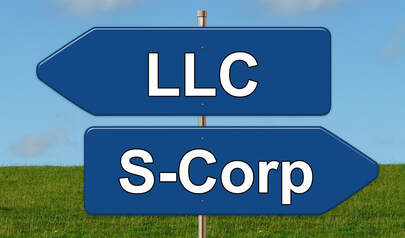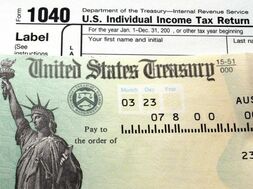AuthorMichelle is the founder and owner of STL Bookkeeping & Tax (formerly MRW Accounting Solutions) in St. Louis, MO. She has a BS in Accounting and 10+ years of business experience in and around the STL area. Archives
April 2019
Categories |
Back to Blog
Do I Need QuickBooks?4/25/2019 The answer to this weeks question is pretty simple. I don't know. QuickBooks can be a big investment for a small business. If your business still has a small enough number of transactions that you can keep everything organized with a spread sheet or pen and paper, then I say continue with what you're doing!! I would say as you add additional bank accounts, credit card accounts, clients, contractors etc. it's time to get some sort of professional accounting software.
I think software allows you to see the big picture of your business and create financial statements for review in an instant. For businesses such as contractors, an accounting software program is imperative to ensure you know the profit you are making on a job in real time. I have worked with so many contractors who have no clue what jobs they've made or lost money on because they simply aren't keeping track. Programs like QuickBooks offer features where your transactions roll in for classification as they happen. The biggest thing this feature does over a "by hand" method, is ensure each and every transaction is accounted for. Additionally, this will likely save time in the long run. For most small business owners who fear spending money on x, y, and z, the big question should be, "what is my return on investment?". If you are an attorney who bills at $250/hour and it takes you 5 hours/month to manage your accounting by hand, chances are QuickBooks (and a bookkeeper) will be cheaper than the $1250 you could have billed that month had you not been focusing on accounting. If you're ready to pass off your paper and pencil method accounting, I would be happy to help! Please contact me at 314-450-1140 to set up a consultation.
1 Comment
Read More
Back to Blog
My Friend Told Me I Can I Deduct....4/18/2019  One of the most common questions I get from small business owners is, "Can I deduct xyz". For the most part they are able to discuss the things they ask about whether that be work travel, a new printer, tax software, lawn mowing equipment, etc. Of course those answers are different based on the line of work the client is in. If I, as an accountant, tried to deduct the cost of my lawn mower, that would be a no go. However, if I had an office where I was required to maintain the outside appearance of my building, a lawn mower may be perfectly acceptable. See how this can get tricky? :) The IRS says for an expense to be a deductible business expense it has to be "ordinary and necessary". That is a fairly vague explanation. Typically if the IRS does an audit and something is considered not deductible in their eyes, it is up to the business owner to prove that it is. You can usually find case law specific to the types of deductions you may be looking to take if you're unsure. Also, as I stated before, what's necessary and ordinary for me as an accountant, may not be necessary and ordinary for someone in a different field. Questions come up a lot around personal appearance items and clothing. People say, "I need to look professional because I'm a realtor, that's why I get my nails done." However, if we go back to the IRS description of necessary and ordinary, I think we see that may not cut it. Can you successfully do your job as a realtor without having your nails done? Now, let's say you're an actress or a model, it may be a requirement of your job that you look and present yourself a certain way, and thus maybe your nail appointments can count. Business owners will tend to get very passionate regarding what they feel should be deductions. Typically a quick Google search can tell you what the IRS stance was on a certain item for your profession, because odds are someone has tried to argue that it is "ordinary and necessary" in the past and either won or lost their argument. If you're unsure if something is deductible, or even the type of deduction you can get for an item, I suggest reaching out to a tax professional before making any big purchases.
Back to Blog
i sold my house, do I owe taxes?4/11/2019  Clients come to my office all the time concerned they're going to owe taxes on the sale of their primary home. Luckily, that is very uncommon. If you owned, and lived in the house, 2 of the 5 years leading up to the sale, you are able to make $500,000 profit ($250,000 filing single) on the sale of your home without tax consequences. The stipulation on this would be if you excluded the gain of a sale of another home within two years of the sale of your current home. That stipulation ensures you are not able to live in a home while upgrading or "flipping" for two years, claim it as your primary home, then sell the home with no tax consequences, over and over again. As you can see, due to the large profit you are able to make on the sale of your primary home, without tax implications, it is not common to owe taxes on this transaction. As with anything regarding taxes, there are additional rules for certain circumstances including transfer of home during divorce, etc. I would always suggest you discuss with a tax professional before making any decisions that may effect your tax return.
Back to Blog
wHAT IS BOOKKEEPING?!3/21/2019  So what IS bookkeeping anyway? Dictionary.com defines bookkeeping as, "the activity or occupation of keeping records of the financial affairs of a business". There are a lot of different ways this activity of record keeping can be achieved. Some people use paper and pencil, excel spreadsheets, boxes of receipts under the bed, memory (we don't suggest this), and probably the most common QuickBooks. Bookkeeping is a way to keep all business expenses in one place, organized and classified, and see the financial health of the business. Each transaction that a business has, be it income, check purchase, credit card purchase, etc. is classified accordingly. These categories include things such as rent, office supplies, utilities, and cost of goods sold. One of the main things that all these classifications are used for is tax preparation. Entering this information into QuickBooks will give you the totals for all of these categories. Beyond tax preparation, the two most common statements produced by accounting software are the income statement (profit & loss) and the balance sheet. The income statement shows the profitability of a business for a certain time frame, so essentially income minus expenses. The balance sheet is a bit more complicated and shows all areas of the business finances including (but not limited to) bank accounts, credit card balances, accounts receivable, accounts payable, inventory, shareholder distributions, and miscellaneous assets and liabilities. Bookkeeping is important because it gives you the ability to see all of your business finances in one place. If you're waiting til the end of the year to total income and expenses, you may be shocked at how much money your small-business actually made because you were just spending everything that came in. Additionally, keeping accurate records ensures you are not missing any deductions to which you are entitled. If you're charging some money to multiple personal credit cards, some to your personal bank account, some to your business bank account, and some cash..how could you possibly be sure you've captured everything at the end of the year? Beyond that, if you do not have good records in place you could find yourself in a bad situation should you find yourself in an IRS audit. If this all sounds overwhelming, luckily for you, this is what STL Bookkeeping & Tax manages for small businesses on a daily basis. Our bookkeeping packages come with a QuickBooks Online subscription included, and help you start to make sense of your business financials. If you'd like to hear more, or talk about your specific situation, please send a message or call 314-450-1140. I would love to talk to you and help you stress less about your bookkeeping! -Michelle Walsh
Back to Blog
Requirements to be an s-corp3/12/2019  "Michelle, my grandma, mom, hair dresser, postman, administrative assistant, flight attendant, dentist, etc, etc, etc. told me I should be an S-Corp to save on taxes. Why haven't we done this?!?!" The above is one of the most common questions I get from small business owners, and the simple answer is, "because you're not an S-Corp". However, let me break this down for you a little further: And S-Corp is a pass-through entity that passes profits down to its shareholders. The tax savings come in that those pass-through profits are not subject to self-employment tax (social security and medicare, approximately 15%). If you are a single-member LLC or sole proprietor, it is very rare you will meet the qualifications of an S-Corporation. It is time to start thinking about becoming an S-Corp when you hire your first employee or hire a contractor who is bringing in income for your business. This may also be true for network marketers who make income from "downlines". At this point, you are no longer the only person making profits for the company and so all profits should not be subject to self-employment tax. I'll use a landscaping company as an example. As soon as a landscaper can afford to hire an employee, let's say he pays him/her $15/hour. The customer paid $1000 for the services and the employee worked for 5 hours. In this scenario, the labor cost was $75, let's say materials were $500, and the profits were $425. For an S-Corp, these profits, brought in by an employee would be considered pass-through income not subject to self-employment tax. *Note, this is strictly for example purposes and there are more factors that would need to be considered for tax purposes. You may be asking yourself how you pay self-employment taxes as an S-Corp and the answer is through a W2. When you make the decision to become an S-Corp, you become an employee of the corporation, as well as a shareholder. Now, of course, the question of how much to pay a shareholder in the form of a W2 comes into play. The simple answer is, you should pay yourself through W2 wages what you would pay someone else to do your job. Only the wages on your W2 are subject to social security and medicare taxes and the rest of the business profits "pass through" to your (and your business partners') individual tax return and are only subject to federal, state, and local income taxes. As you can see, there is more to becoming an S-Corp than just tax savings. If the IRS audits your S-Corp return and you do not have W2 wages, or do not have enough W2 wages, they can reclassify the business profits causing you to be on the hook for additional taxes and penalties. In addition, something I remind my clients is, if you do everything you can to avoid paying any social security an medicare tax during your working life....you may not be eligible for social security when you're of age, you have to pay into these programs to get anything out. This means, if you don't have a retirement plan in place outside of social security, and you avoid paying social security taxes during your working life, you could be working for a very long time. If you believe you are an S-Corp, I can help you file the appropriate paperwork with the IRS and start reaping the tax saving benefits even for 2018's tax filing! Please contact me at [email protected] or 314-450-1140 to discuss more.
Back to Blog
what does itemized deduction mean?2/28/2019  One of the most common discussions I have with clients is regarding itemized deductions. In last weeks blog I explained itemized deductions, but I wanted to explain the difference in a little more detail. I find that so many clients who previously used online software to self-prepare have no clue they actually were using the standard deduction and not itemizing. As we discussed in my last blog, on each tax return you either get the standard deduction or itemized deductions. First, let me explain the standard deduction. Standard Deduction The standard deduction is just as the name implies, standard. Every single taxpayer is eligible for this deduction (Gets a little tricky on married filing separately, but that's a conversation for a different day). How much the standard deduction is depends on filing status. Single or married filing separately filers receive a standard deduction of $12,000 under the new tax law. Head of house hold filers (one taxpayer and at least one dependent) receive a standard deduction of $18,000. And married filing joint return filers receive a standard deduction of $24,000. The standard deduction automatically lowers your taxable income. For example, a single woman making $50,000 on her W2 would only pay taxes on $38,000 of her income without having any other deductions. Itemized Deduction If a taxpayer or taxpayers have itemized deductions (allowable medical expenses, state tax, real estate and property tax, mortgage interest, mortgage insurance, and charitable contributions) totaling MORE THAN their filing status's standard deduction, then that taxpayer can itemize and get a deduction larger than a taxpayer who doesn't reach that limit. This means, from our previous example, if the single woman making $50,000 had itemized deductions totaling $12,005, she would pay tax on $37,995 of her income before taking into consideration any other eligible deductions. As you can see from these examples, it takes a lot of itemized deductions to achieve a total larger than your standard deduction. Especially for 2018 tax year filings, as the standard deduction amounts were doubled. A lot of taxpayers I sit down with believe they have itemized for many years because their online software has them enter all this information, however, when we actually look at the numbers.....they were using the standard deduction all along. This is why I feel it is SO important to work with a tax professional so you can actually understand how your tax refund or bill amount was achieved. If you have any questions, comments, or to set up a tax consultation, please send me a message or call my office at 314-450-1140.
Back to Blog
Can I write that off??2/22/2019 One of the first things people ask me when they hear I am an accountant is "Can I write ___ off?". As with most areas of tax code and accounting, the answer is often more complex than the average person is actually interested in learning. In this blog, I'm going to focus on personal tax deductions or Schedule A itemized deductions. Next week we'll dig deeper into small business deductions!
New this year, the standard deduction for single or married filing separate was doubled to $12,000 and married to $24,000. I think most people know this information by now. So now the next question is, "what do I have to do to itemize?" Medical Expense Write-Off: Whether or not you can write off medical expenses depends on a lot of factors. The first of which being, did your medical expenses total MORE THAN 7.5% of your adjusted gross income. For most people, this stipulation knocks them out of contention almost immediately. For an example, for an average person making $50,000/year you'd have to have $3,750 in medical expenses, and even THEN it's only the amount OVER $3,750 that can be included in your itemized deductions. That means for this example, if you had $3,850 in medical expenses for the year, you could add $100 to your itemized deductions. You'll also note that I said ADD this amount to your itemized deductions. If you don't reach the amount necessary to itemize in total deductions ($12,000/$24,000) medical deductions will make no difference regardless. State & Local Taxes Write-Off: State & Local taxes paid can be itemized up to $10,000 or $5,000 if single (previously was unlimited). This new stipulation of up to $10,000 is definitely impacting how many Americans can itemize this year. State and local taxes include: state taxes paid, local taxes paid (STL City for example), real estate taxes paid, and personal property taxes paid. Now, if you have relatively high income and high real estate taxes you will likely be capped on this section of itemized deductions. Mortgage Interest Paid: Mortgage interest is pretty self-explanatory. You receive a 1098 mortgage interest statement and the interest on that statement is an itemized deduction. Again, assuming you have enough in itemized deductions to exceed the standard deduction. Certain taxpayers can also get a small amount of itemized deduction for mortgage insurance as well. Charitable Contributions: Charitable contributions are included in itemized deductions as well. When you make a cash donation, you should receive a receipt for the amount of the deduction. Things like golf tournaments and dinners will include on that receipt the portion that was deductible (you can't deduct the $200 you paid for the golf tournament, because $100 was for playing golf so only $100 is deductible.) Additionally, there are deductions for clothing, furniture, etc. When you make a non-cash donation it is important to get a receipt and accurately report the items donated and amount you could receive for an item if sold at a thrift shop. (For example, that $10 shirt you got from Old Navy 15 years ago doesn't count for a $50 charitable donation deduction) These types of deductions can be a little hairy as a lot is left up to interpretation so it is best to err on the side of caution. In Conclusion: Assuming you made it this far, the most important thing to remember is that all of the above items have to equal MORE THAN your standard deduction for your filing status to see any benefit from these deductions. Prior to 2018 tax year I would say roughly 50% of my clients benefited from itemized deductions. With the new tax law, I have yet to have one client reach enough in itemized deductions to surpass the standard deduction. A lot of people get tricked, for lack of a better word, by Turbo Tax into thinking they are seeing a benefit from their $100 donation to the charity of their choice because Turbo Tax has their clients enter all of this information with no explanation of how it works. If you're interested in having a better understanding of your taxes, please set up an appointment with me today! -Michelle Walsh
Back to Blog
How long until I receive my tax refund?2/19/2019  Perhaps the second most asked question I receive as a tax preparer is "When will I get my refund?" This is a close second only to, "How much is this going to cost me?" The best answer to this question is to check the IRS tax refund website here. On this page you will need to know your exact refund amount, filing status, and social security number. Now, the short answer to this question is, within 21 days of filing if receiving refund direct deposit and 21-30 days if receiving refund by check. That being said, this year, most refunds that do not include EIC have been receiving their refunds in 10-12 days direct deposit. It is, of course, unclear if this will continue as the season continues, so we suggest to get your taxes filed as soon as possible if you would like your refund quickly. If it has been 21 days since filing and there is no update on the IRS "Where's my refund" page, this likely means there is a problem with your return. Do not panic, this can be any number of things, and is usually easily fixable. If you need to get your taxes filed in St. Louis we are happy to help at STL Bookkeeping & Tax. Additionally, if you've received a dreaded letter from the IRS that there is a problem with a return you have filed, give us a call at 314-450-1140 and we'd be happy to discuss your options!
Back to Blog
Why is my refund less than last year?2/15/2019  At this point, a lot of people in St. Louis have begun to receive their tax refunds and are comparing refunds with their friends, families, and co-workers. The first thing I want to say is, you CAN NOT compare your tax refund/bill to anyone else unless you have the EXACT SAME dependents, income, filing status, state taxes, dependent care, etc. Seeing as how that is extremely unlikely, the point is: do not compare! That being said, if you got a smaller or larger refund this year, you may not totally understand why. One thing that people may not be fully understanding is the tax tables changed last year for the first time since the early 80's along with the largest tax overhaul in decades. These two changes at the same time can leave anyone confused! When the tax tables changed, if you claimed 1 (one) on your W4 for as long as you've been a working person, claiming 1 no longer meant the same withholding in 2018. For a quick example, for every $1,000 you made in 2017, you had $100 withheld in taxes. In 2018, for every $1,000 you made, still claiming 1, only $90.00 was withheld. (these figures are all made up for explanation purposes, and should not be used to make any tax decisions) Because of this, you saw extra money on each check (on average $20-$50), but that now means that your refund is smaller. It is important to note, that may not mean your total tax BILL (the total amount of taxes you paid in 2018) was larger. If you're not sure what you paid in total taxes in 2017 as compared to 2018, this would be a great question for your tax professional to see if the new tax plan actually helped or hurt you from a tax perspective. Your refund amount is not necessarily a good indicator of the big picture. If you don't have a tax preparer/planner in the St. Louis or St. Charles area, I would love the opportunity to look over your taxes for you and let you know where you stand. I may even find deductions that you missed when preparing taxes yourself! Please call or text me, Michelle Walsh at 314-450-1140 and I'd be happy to take a look for you. If I find an opportunity for larger tax savings, we can set up a time for you to come in and amend the return you filed.
Back to Blog
Tax Updates for small business 201811/19/2018 At this point I'm sure most everyone is aware of the Tax Cuts and Jobs Act going into effect for the 2018 tax season. One of the big changes for this tax year involves small businesses. Businesses that meet certain qualifications will be eligible for a 20% deduction in taxable net profits. Because of this, businesses will want to make sure to plan accordingly to maximize these tax benefits.
Who is Eligible for the Deduction? All types of businesses except C-Corps. This will include most types of small businesses. Single-Member LLC's, Sole-Proprietors, S-Corps, and Partnerships. That being said, there are some profit thresholds where parts of this discount start to "phase-out". What are the Limitations? For a married filing joint tax return, the total income can not be higher than $315,000. For individual filers, the total income can not be higher than $157,500. If your income is under those amounts, you are eligible for the 20% discount in income (Hooray!) What happens if I make more than the limit? If your income is above the limits listed above, your deduction is the lessor of: 20% of your business income OR The greater of: 50% of your share of your business's W2 wages or 25% of your share of your business's W2 wages plus 2.5% of your unadjusted basis in the business property. If you are a service industry business (accountants, lawyers, health professionals) you will use the above equation, but the deduction is phased out completely at $415,000 MFJ and $207,500 all other returns. This means as we approach the end of the year, it is important to know where you are so you can plan accordingly. For small businesses under the threshold, a Roth IRA may be more beneficial than a traditional as long as the 20% small business deduction is in place, for example. If you'd like to get your bookkeeping in order before the end of the year to know where you stand or to discuss tax planning please contact me! |
 RSS Feed
RSS Feed
